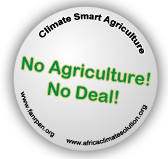 ACCID RSS newsfeed ACCID RSS newsfeed
Delayed climate deal a risk to food production, ag specialists say
07 December 2011, AlertNet
URL: http://www.trust.org/alertnet/news/delayed-climate-deal-a-risk-to-food-production-ag-specialists-say
The dun maize field spreading out at Dumisani Ndlovu’s offers a hint of a bleak future. Baked by the sun and deprived of water, the crops on his farm in Giyani, in South Africa’s Limpopo province, are parched and nearly dead.
Ndlovu, a third-generation farmer, pulls a leaf from a plant that ought to be plump and green.
“We are not going to feed the people with this,” he says.
The problem Ndlovu faces is the increasing unpredictability of the weather.
“It is no longer raining during the rainy season, but it’s raining in the non-rainy season. The cold season is also shrinking,” he explains.
Farmers throughout the country face rising difficulties from water shortages as well as flash floods. Their crops and livestock are afflicted by emerging pests and diseases and by heat waves worse than anything they remember.
Scientists believe that much of the extreme weather is caused or worsened by human-induced global warming and climate change.
As Ndlovu and other farmers around the world struggle, another attempt to resolve global climate challenges is taking place in South Africa’s Indian Ocean port city of Durban.
With intensifying climate disasters and global economic turmoil as the backdrop, delegates from 194 nations have gathered to try to advance, if only incrementally, the world’s response to climate change.
To those who have followed the negotiations under the U.N. Framework Convention on Climate Change (UNFCCC) over their nearly 20-year history, the conflicts and controversies at the Durban meeting are monotonously familiar: the differing obligations of industrialised and developing nations, the question of who will pay to help poor nations adapt, the urgency of protecting tropical forests, the need to develop and deploy clean energy technology rapidly.
The negotiating process itself is also under fire, particularly by the poorest nations, who believe their needs are being neglected in the squabbles among the major economic powers.
But scientists warn that conflict will only delay actions that must be taken to reduce climate-altering emissions and to fortify vulnerable nations’ ability to respond to the changes that many experts and observers say are already here. Threats to farming are a particular concern.
RISING TEMPERATURES
Temperatures are rising rapidly during the growing season in some of the most important agricultural regions in the country, said Belynda Petrie, chief executive officer of One World, a Cape Town-based climate consultancy organisation.
According to Petrie, in coming decades farmers need to double the amount of food they produce to meet rising demand, even as climate shocks come their way.
“And they need to do it while reducing the considerable environmental damage caused by the business of agriculture,” added Petrie.
Oxfam’s Kelly Dent says storms and drought that have unleashed dangerous surges in food prices could be a "grim foretaste" of what lies ahead when climate change bites more deeply.
Presenting the British charity’s report at the beginning of the UN conference, Dent said falling production of major crops had driven millions of people into poverty over the past year and a half.
“This will only get worse as climate change gathers pace and agriculture feels the heat. When a weather event drives local or regional price spikes, poor people often face a double shock,” explained Dent.
Oxfam appealed to the conference to slash greenhouse gases and activate a planned fund to help poor countries.
GREEN CLIMATE FUND
Breathing life into the Green Climate Fund is one of the goals of the conference. By 2020 it is supposed to channel $100 billion a year to countries facing the brunt of climate change. But moves to active the fund have been held up by squabbles over its design.
Lindiwe Sibanda, director of the Food, Agriculture and Natural Resources Policy Analysis Network (FANRPAN), said this year’s Agriculture and Rural Development Day (ARDD) on December 3 at Durban aimed to push the problem facing agriculture to the forefront of climate negotiations. FANRPAN is a regional policy research and advocacy network.
“Currently agriculture is not on the (negotiations) programme, so the ultimate goal of ARDD is to ensure that agriculture is considered in the negotiations. We are saying, ‘No agriculture, no deal’,” she explained.
Tina Joemat-Pettersson, South Africa’s agriculture minister, said that she and her counterparts from the continent intend to use the negotiations to push for “climate-smart agriculture.”
Joemat-Pettersson said there is consensus that climate change will have a significant impact on agriculture in developing countries.
“Even a 2 degree Celsius rise in the mean global temperature by the year 2100, which is regarded as an optimistic scenario, will radically change the face of farming,” she said.
Her government sees even more far-reaching economic impact to be dealt with.
“Any changes in the climate could have wide ranging repercussions not only in the production of food, fibre and fuel, but also on GDP, employment and foreign exchange earnings. It will have dramatic consequences for agriculture. Water resources will become more variable, droughts and floods will stress agricultural systems, some coastal food-producing areas will be inundated by the rising sea levels, and food production will fall in some places," Joemat-Pettersson said
In Giyani, Dumisani Ndlovu is already experiencing the last of these threats first hand.
“We are losing hope as farmers,” he says, “for the great agricultural system that feeds the nation.”
|

